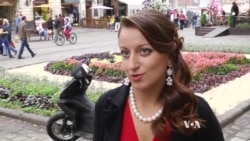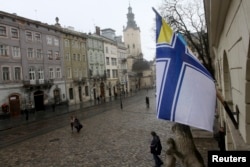The western Ukrainian city of Lviv prides itself on being both physically and culturally close to Western Europe. The Russian-backed separatists in the eastern part of the country are 1,200 kilometers away, and seemingly even farther away in their world view. Still, the war is having an impact in the city.
Lviv has an Old World charm to it, with cobblestone streets around the old City Hall, where local wedding parties cross paths with Ukrainian and foreign tourists in a year-round street market. It’s a place where people have come from as far away as the conflict zone for a bit of respite.
But Mayor Andriy Sadovyi, whose office balcony overlooks the market, says the turmoil is never far from their minds.
“We all are Ukraine. We all are Ukrainians. Today, we have a disaster in the east. This disaster is reflected in the hearts of every Lviv citizen.…We are really worried… but we have to understand that our good work is also part of the success of our country,” says Sadovyi.
Conversations with people in the market reflect the mayor’s sentiments.
Ira, a bookkeeper, says she’s shaken by events in the east.
“I’m really sad right now about what’s going on in the country. I wouldn’t wish any country would go through what we’re going through right now,” says she.
Mykola, a doctor, agrees.
“We’re nervous and worried. So of course we cannot help but feel pain about the events that are happening in the country,” said he.
Still, amid the classic architecture and old churches of Lviv, it’s hard to believe towns have been destroyed in another part of the country. And that does lead to a certain level of detachment, admits Taras Voznyak, who has been publishing “I” magazine since Soviet times and is now running for parliament.
“We are not completely isolated from what’s happening in the east, but we realize that the people in Donbas, in the east of Ukraine, have to decide for themselves whether they want to participate in the construction of a new Ukrainian political nation, or whether they will leave it,” says Voznyak.
That decision has been complicated by Russia’s intervention, but here in Lviv most people leave little doubt about which way they want their city, and their country, to go.
“West? East? I would say to the West. I don’t know what the West will bring us, but I would like it if we had more freedom. That’s the first thing,” says Ludmilla, a retired accountant.
Marko, an entrepreneur, concurs.
“West, only West. We had enough of the East already.”
In Lviv, it’s easy to imagine Ukraine as part of the European Union, as the protesters who toppled the country’s government in February envisioned. Many of them were from this area. But the intervening months have proved that won’t be as fast, smooth or easy as they had dreamed.






